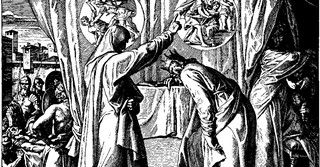What Is a Prophet?
Share

“Surely the Sovereign Lord does nothing without revealing his plan to his servants the prophets” (Amos 3:7).
Many mentions of prophets are made in the Bible. In fact, a section of the Old Testament is devoted to a collection of books by them. Their names, and quotes, appear all over the New Testament and are the subject of sermons to this day. But just what exactly is a prophet, and what is important for us to know about them?
Simply put, a prophet is someone chosen by God to speak for God. Their job, whatever the time period or tidings, was to accurately impart His message. Men and women called to this task came from differing backgrounds, personalities and levels of social status. But what they all had in common was a heart for God, an anointing to hear from Him, and the faithfulness to impart his message to others.
“For prophecy never had its origin in the human will, but prophets, though human, spoke from God as they were carried along by the Holy Spirit” (2 Peter 1:21).
God told the young Israelite nation He was to be their King, but the people clamored for a human king instead. As God put a succession of rulers in place, He provided prophets to advise them, and to declare His word directly to the nations. This was called the “classical age” of prophets.
Photo credit: ©Getty Images/fotomaximus
Who Are Some Prophets in the Bible?

This small list is a sampling of those God called to serve Him:
Isaiah - Considered by most to be the greatest of God's prophets, Isaiah's ministry lasted through the reigns of five of Judah's Kings.
“Then I heard the voice of the Lord saying, ‘Whom shall I send? And who will go for us?’ And I said, 'Here am I. Send me!” (Isaiah 6:8).
Jeremiah - Known as “the weeping prophet” because of his sorrow over the state of Judah, Jeremiah authored two Old Testament books.
“... But the Lord said to me, ‘Do not say, I am too young. You must go to everyone I send you and say whatever I command you. Do not be afraid of them for I am with you’” (Jeremiah 1:7-8).
Ezekiel - A trained priest, Ezekiel recorded clear and dramatic visions to the Israelites in Babylonian captivity.
“Go now to your people in exile and speak to them. Say to them, ‘This is what the sovereign Lord says,’ whether they listen or fail to listen” (Ezekiel 3:11).
Jonah - Famous for being swallowed by a great fish, Jonah resisted but finally obeyed God’s instruction to take a call for repentance to an enemy nation, spurring the revival of Nineveh.
“The word of the Lord came to Jonah son of Amittai: ‘Go to the great city of Nineveh and preach against it, because its wickedness has come up before me’” (Jonah 1:1).
Malachi - The author of the last book of the Old Testament, Malachi passionately confronted Jerusalem’s population about the neglect of God’s temple and their false worship.
“A prophecy: the word of the Lord to Israel through Malachi… ‘A son honors his father, and a slave his master. If I am a father, where is the honor due me? If I am a master, where is the respect due me?’ says the Lord Almighty” (Malachi 1:1, 6).
Photo credit: Wikipedia/Julius Schnorr von Carolsfeld
How Many Prophets Were There?

God has used a great number of people as prophets both in Biblical times and beyond, so the exact number is difficult to say. In terms of Old Testament Scripture, 17 prophetic books were written or compiled during the Age of Kings. But other books contain examples of individuals who received visions or a direct word from the Lord, and many of them told others what they saw.
Here are some instances in the Old Testament that are prophetic in nature:
Jacob gave his sons a blessing that served as a foretelling of the future 12 tribes of Israel (Genesis 49:1-28).
Joseph shared his dreams as a boy, as well as interpreting other dreams years later in Egypt, with widespread results (Genesis 37, 41).
Samuel heard and spoke about God’s plan to cut off the family line of Eli, installing David as King, and numerous other pronouncements (1 Samuel 3, 15).
Were There Any Women Prophets?
Throughout the Bible, God called women as well as men to declare God’s messages. This holy work was given to a few in the Old Testament:
- Miriam (Exodus 15)
- Deborah (Judges 4)
- Huldah (2 Kings 22)
- Isaiah’s wife/”prophetess” (Isaiah 8)
Along with Anna, others continued the line of women who prophesied into New Testament times. For example, Philip the evangelist had “four unmarried daughters who prophesied” (Acts 21:19).
Photo credit: ©Getty Imgaes/roterpanther
Prophets in the New Testament

The tradition of prophecy continued in the New Testament. John the Baptist proclaimed the coming of Jesus and pronounced the start of His ministry.
“Then what did you go out to see? A prophet? Yes, I tell you, and more than a prophet” (Matthew 11:9).
The Apostle John received and recorded visions from God about heaven and end-time events.
“Blessed is the one who reads aloud the words of this prophecy, and blessed are those who hear it and take to heart what is written in it, because the time is near” (Revelation 1:3).
Anna recognized and worshipped the Messiah when she saw Him in the temple.
“There was also a prophet, Anna, the daughter of Penuel, of the tribe of Asher...Coming up to them at that very moment, she gave thanks to God and spoke about the child” (Luke 2:36, 38).
Agabus predicted an upcoming famine in the Roman world, and later foretold Paul’s arrest.
“After we had been there a number of days, a prophet named Agabus came down from Judea” (Acts 21:10).
Note that Jesus did speak prophetically during His earthly ministry, not just as a human man hearing from God, but as the Son of God. Prophecy was just one way He blessed the people, along with healings, teachings, and miraculous signs.
Photo credit: Unsplash/Matthias Wagner
What Are the Prophetic Books?

The term “prophetic books” is used to mean a group of writings in the Old Testament. They have been divided into two groups, major and minor. The distinction relates to the size of the book rather than the importance of the individual or the message.
Books by the Major Prophets:
Isaiah: Written between 700 and 681 BC. Themes include the Holiness of God, the prediction of the invasion of Jerusalem and the Future Coming of the Deliverer.
Jeremiah: Written in 627-586 BC. Themes include the sin of God’s people, the prediction of Jerusalem’s destruction, and the new work God will do through the Messiah.
Lamentations: Written in 586 BC. Themes include a look back on the destruction of Jerusalem, and the promise of God’s mercy and hope.
Ezekiel: Written in 571 BC. Themes include God’s perfection vs. the sin of man, the restoration for those who turn from sin, and the rebuilding of God’s temple along with a renewal of worship.
Daniel: Written in 536 BC. Themes include God’s ultimate control, and the importance of remaining faithful to Him through challenges and trials.
The Books by the Minor Prophets:
Hosea: Written in about 715 B..
Joel: Written between 835 and 796 BC.
Amos: Written between 760 and 750 BC.
Obadiah: Written either in 855-841 BC., or in 627-586 BC.
Jonah: Written around 785-760 BC.
Micah: Written between 742 and 687 BC.
Nahum: Written between 663 and 612 BC.
Habakkuk: Written between 612 and 588 BC.
Zephaniah: Written in 640-621 BC.
Haggai: Written in 520 BC.
Zechariah: One part written 520-518 BC., the other around 480 BC.
Malachi: Written in about 430 BC.
Photo credit: Unsplash/Sincerely Media
What Did Prophets in the Bible Do?

There is no one job description that covers all the prophets. But their ministries included one or more duties such as teaching, writing and preaching - to a local crowd, or a larger audience.
Many times God directed prophets to act out their messages as visual reminders. Isaiah walked barefoot and stripped down for three years to signify Jerusalem's coming captivity. Jeremiah made and wore a yoke of wood to represent the way the Babylonian King would oppress the Israelites.
The work of prophets often brought difficulties and dangers such as verbal abuse, beatings and imprisonment, if not worse. But each remained devoted to the Lord’s cause and received His strength to persevere.
What Are False Prophets?
In the first books of the Bible, God gives a warning about false prophets. He told his people to be aware that some who claim to speak for Him may actually be trying to lead them astray. Their “holy” visions or instructions might not be divinely inspired at all.
“’Therefore,’ declares the Lord, ‘I am against the prophets who steal from one another words supposedly from me. Yes,’ declares the Lord, ‘I am against the prophets who wag their own tongues and yet declare, ‘The Lord declares.’ Indeed, I am against those who prophesy false dreams,’ declares the Lord. ‘They tell them and lead my people astray with their reckless lies, yet I did not send or appoint them. They do not benefit these people in the least,’ declares the Lord” (Jeremiah 23:30-32).
According to God, these false prophets practiced divination, sorcery and fortune-telling by relying on their own imaginations or even the enemy’s lies rather than His truth. But it is by this truth that believers can stand against any deception.
“Dear friends, do not believe every spirit, but test the spirits to see whether they are from God, because many false prophets have gone out into the world” (1 John 4:1).
Photo credit: Unsplash/Juan Pablo Rodriguez
Are There Still Prophets Today?

There is debate about whether prophets are still being used today. One line of thought is that because all believers now have access to God through the work of Jesus on the cross and the whole Bible, there is no need for prophets anymore
Others claim to have witnessed prophecy and attest to its existence. The Apostle Paul wrote about the followers of Christ in this Age receiving gifts of the Spirit, and mentions prophecy among them.
“Now to each one the manifestation of the Spirit is given for the common good. To one there is given through the Spirit a message of wisdom, to another a message of knowledge by means of the same Spirit, to another faith by the same Spirit, to another gifts of healing by that one Spirit, to another miraculous powers, to another prophecy...All these are the work of one and the same Spirit, and he distributes them to each one, just as he determines” (1 Corinthians 12:7-12).
But Jesus Himself reminded His listeners to always be cautious: “Watch out for false prophets. They come to you in sheep’s clothing, but inwardly they are ferocious wolves” (Matthew 7:15).
Humans have always desired to know more about the mysteries of the world around them, and to see what the future holds. God has graciously allowed His people glimpses into His Word, ways and plans. Prophets have played an important role in this process, serving through the centuries as “God’s mouthpiece” to those willing to listen.
Photo credit: ©Getty Images/4maksym
Heather Adams is an author, speaker, and singer living in Connecticut. Heather’s passion is to equip and encourage believers to seek more of God’s truth and to experience more of His joy each day. Her book, “Bow Down: The Heart of a True Worshipper” is a practical, 30-day devotional about worship. Worship Walk Ministries, her blog, offers weekly Scripture passages and insights to ponder. Heather shares her home with her family, an English setter named Marcie and Galaxy, the most curious cat she’s ever met. You can connect with her on her website: heatheradamsworshipwalk.com
